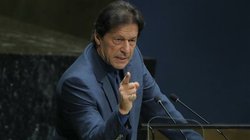 Pakistan’s Prime Minister Imran Khan says a “bloodbath” will take place in Indian-administered Kashmir when India lifts its “inhuman” curfew imposed when New Delhi stripped the disputed region of its autonomous status.
Pakistan’s Prime Minister Imran Khan says a “bloodbath” will take place in Indian-administered Kashmir when India lifts its “inhuman” curfew imposed when New Delhi stripped the disputed region of its autonomous status. RNA - Addressing the annual United Nations General Assembly on Friday, Khan condemned the lockdown that was imposed on the Himalayan region by the Indian authorities in order to avoid large protests against India’s decision to revoke the region’s special status on August 5.
India has flooded the region with military forces since the decision was announced, drawing widespread criticism. Recent government data showed that authorities in Indian-controlled Kashmir detained about 4,000 people in the crackdown over the past weeks.
“What sort of a mindset would lay siege to eight million people with 900,000 troops? Women, children, sick people locked in as animals,” Khan said. “What is going to happen when the curfew is lifted will be a bloodbath.”
Khan stressed that India must lift the “inhuman” curfew and free the detainees.
The Pakistani premier also reiterated his warning that any all-out conflict between the two nuclear-armed neighbors would have consequences for the world, urging the UN to take action.
“If this goes wrong, you hope for the best but be prepared for the worst,” Khan said. “If a conventional war starts between the two countries... anything could happen. But supposing a country seven times smaller than its neighbor is faced with the choice — either you surrender or you fight for your freedom till death?”
“What will we do? I ask myself this question... and we will fight ... and when a nuclear-armed country fights to the end, it will have consequences far beyond the borders,” he said, apparently implying that Pakistan may ultimately use its nuclear weapons to survive in a potential war with the much-larger India.
He also called on the world to “give the people of Kashmir the right of self-determination.”
Kashmir is disputed territory. It has been split between India and Pakistan since their partition in 1947. The countries have fought three wars over it.
847/940